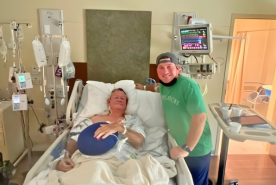Guide for kidney recipients on writing to donors or families: share your transplant experience, maintain confidentiality, and follow sending instructions.
Deciding whether to write to your living donor or donor’s family is a personal choice. It may help to know that usually donors or their family members express appreciation for the letters or cards they receive from transplant recipients. Nevertheless, some recipients will choose to write to their living donor or donor family and others will not.
You may not want to write at this time, but you may decide in a few months or years from now that you would like to do so. You may feel more comfortable sending a card during the holidays, a “Thinking of You” card, or even a card that simply says “Thank You” if you choose not to write a letter. Whatever your decision, there is no time limit for sending a letter or a card.
If you decide to write, here are some suggestions:
- Write about your personal transplant experience. You may want to include how the experience affected your life.
- Use simple language and communicate in a sensitive manner.
- You may want to thank your living donor or your donor family.
If you received your transplant from an anonymous donor:
- Write about yourself and information about your job, your family and friends, your hobbies and interests, as well as the name of the state in which you reside.
- Avoid including any last names, street addresses, city names, phone numbers or names of hospitals and physicians.
Getting Started
Here are some sample phrases and sentences to get you started:
When writing to a living donor:
- I don’t really know what to say except thank you.
- I wanted to let you know what a difference your kindness has made in my life.
- I am 45 years old and have two wonderful children. It is wonderful to watch them grow.
- I will never be able to tell you all the feelings that I have for you, but I want you to know how grateful I am for the chance you have given me to continue living a normal, productive life.
- I would like to thank you for your generosity in giving me an organ.
- Words can’t begin to describe how grateful I am to you. I have grown to appreciate life and I do not take it for granted.
- It has been two months since I received my new kidney and I am able to work full time now and live my life to the fullest with my family.
- My husband’s transplant has given us all another chance for a normal life. He is a loving husband, father and grandfather. Thank you.
- I think of you often and I thank you from the bottom of my heart.
When writing to a donor family member:
- I will never be able to tell you all the feelings that I have for your family, but I want you to know how very grateful I am.
- I would like to thank you for your generosity in giving a part of your loved one to me. I am very sorry for your loss.
- I am growing stronger and healthier every day and keep your family in my thoughts and prayers, always.
- What a blessing you have given me. I keep your family in my thoughts and prayers.
- Thank you for entrusting me with a living legacy from your loved one. I will treasure this gift.
After you have completed your letter or card
If you do not know your living donor or donor family member:
- Place the letter or card in an unsealed envelope.
- Include a separate sheet of paper with your full name and date of your transplant.
- After writing to your donor family, mail your letter to the organ recovery organization. If you received your transplant from an anonymous living donor, mail your letter to the transplant coordinator where you were transplanted.
With your permission, your letter or card may be reviewed to ensure confidentiality. The recovery professional may first contact the donor or donor family to request permission to forward the correspondence. If the donor or donor family do not wish to receive your communications or to communicate further with you, the professional will inform you of that decision.
Keep in mind: Some living donors or donor family members may send a letter or card to you in response to your letter. Others may choose not to write to you at this time. This is their personal decision.
For More Information
If you have questions or concerns about the information outlined in this brochure, please contact the National Kidney Foundation (1.855.653.2273 or nkfcares@kidney.org) or your local organ procurement (recovery) organization.

















